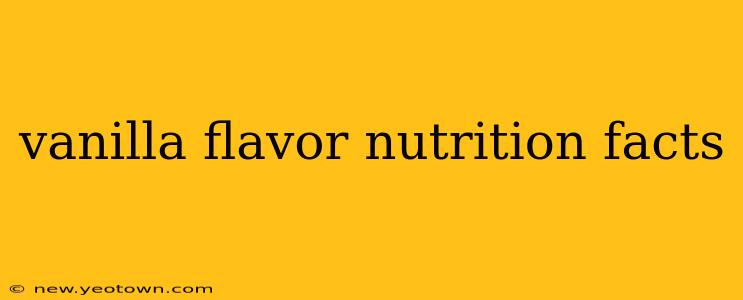Vanilla. The very word conjures images of warm cakes, creamy ice cream, and comforting beverages. But beyond its delightful aroma and taste, what's the nutritional story behind this beloved flavor? Let's embark on a journey to uncover the truth about vanilla flavor nutrition facts, dispelling myths and revealing the surprising realities.
It's crucial to understand that the nutritional profile of "vanilla flavor" depends heavily on its source and the ingredients used to create it. We're not talking about the pure vanilla bean here, which boasts a slightly different profile, but rather the extracts, artificial flavorings, and blends often found in processed foods.
What are the Main Ingredients in Vanilla Flavoring?
Vanilla flavoring, whether natural or artificial, rarely appears alone. Its presence usually signifies a complex blend of other ingredients. Natural vanilla extract, for example, primarily consists of ethanol (alcohol) and vanilla bean extract, which itself is composed of various compounds contributing to its aroma and taste. Artificial vanilla flavorings, on the other hand, typically involve a cocktail of chemicals designed to mimic the complex profile of natural vanilla, often supplemented with other additives.
Does Vanilla Flavor Have Calories?
This is where things get interesting. Pure vanilla extract, due to its alcohol base, contains calories. However, the amount is usually negligible – a teaspoon contains only a few calories. The calorie content drastically changes when we consider how vanilla flavoring is used in processed foods. The calories you consume from a vanilla-flavored product will largely depend on the other ingredients, such as sugar, fat, and other additives.
Does Vanilla Flavor Contain Sugar?
Not inherently. Pure vanilla extract is sugar-free. However, many products using vanilla flavoring are loaded with added sugars. Think of vanilla-flavored yogurt, ice cream, or syrups. The vanilla flavor itself is not the sugar culprit; it’s the added sugars in the final product that significantly impact your sugar intake.
Is Vanilla Flavoring Gluten-Free?
Generally, yes. Pure vanilla extract and most artificial vanilla flavorings are naturally gluten-free. However, as with sugar content, the overall gluten status of a vanilla-flavored product depends on the other ingredients. Always check the label for specific ingredients, particularly if you have celiac disease or a gluten sensitivity.
Is Vanilla Flavoring Vegan?
Again, this depends on the source. Pure vanilla extract is vegan-friendly. However, some artificial vanilla flavorings might contain animal-derived products. Always check the ingredient list to ensure it adheres to your vegan dietary requirements.
What are the Potential Benefits of Natural Vanilla Extract?
While the nutritional value of vanilla flavor itself is minimal, natural vanilla extract might offer some subtle benefits. Some studies suggest that compounds found in vanilla beans may possess antioxidant properties, although more research is needed to definitively confirm significant health impacts.
Is Vanilla Extract Safe for Consumption?
In moderation, yes. Pure vanilla extract is generally considered safe for consumption. However, excessive consumption could have side effects due to its alcohol content. Artificial vanilla flavorings require careful consideration of the specific ingredients listed, as some chemicals may be potentially harmful in large quantities. Always consult a healthcare professional if you have concerns.
In conclusion, the "nutrition facts" for vanilla flavor are complex. It's not the vanilla itself that significantly impacts your health but rather the overall composition of the product it’s added to. Always read food labels carefully, paying attention to added sugars, fats, and other ingredients. Understanding this nuance helps you make informed choices to enjoy the delightful taste of vanilla while maintaining a balanced diet.

